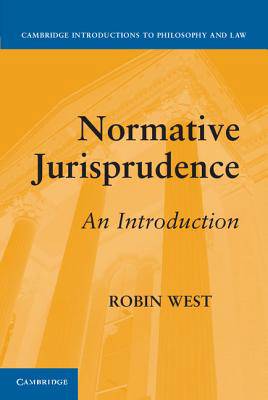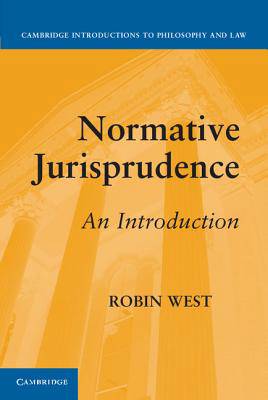
Je cadeautjes zeker op tijd in huis hebben voor de feestdagen? Kom langs in onze winkels en vind het perfecte geschenk!
- Afhalen na 1 uur in een winkel met voorraad
- Gratis thuislevering in België vanaf € 30
- Ruim aanbod met 7 miljoen producten
Je cadeautjes zeker op tijd in huis hebben voor de feestdagen? Kom langs in onze winkels en vind het perfecte geschenk!
- Afhalen na 1 uur in een winkel met voorraad
- Gratis thuislevering in België vanaf € 30
- Ruim aanbod met 7 miljoen producten
Zoeken
Omschrijving
Normative Jurisprudence aims to reinvigorate normative legal scholarship that both criticizes positive law and suggests reforms for it, on the basis of stated moral values and legalistic ideals. It looks sequentially and in detail at the three major traditions in jurisprudence - natural law, legal positivism, and critical legal studies - that have in the past provided philosophical foundations for just such normative scholarship. Over the last fifty years or so, all of these traditions, although for different reasons, have taken a number of different turns - toward empirical analysis, conceptual analysis, or Foucaultian critique - and away from straightforward normative criticism. As a result, normative legal scholarship - scholarship that is aimed at criticism and reform - is now lacking a foundation in jurisprudential thought. The book criticizes those developments and suggests a return, albeit with different and in many ways larger challenges, to this traditional understanding of the purpose of legal scholarship.
Specificaties
Betrokkenen
- Auteur(s):
- Uitgeverij:
Inhoud
- Aantal bladzijden:
- 220
- Taal:
- Engels
- Reeks:
Eigenschappen
- Productcode (EAN):
- 9780521738293
- Verschijningsdatum:
- 22/08/2011
- Uitvoering:
- Paperback
- Formaat:
- Trade paperback (VS)
- Afmetingen:
- 152 mm x 226 mm
- Gewicht:
- 362 g

Alleen bij Standaard Boekhandel
+ 123 punten op je klantenkaart van Standaard Boekhandel
Beoordelingen
We publiceren alleen reviews die voldoen aan de voorwaarden voor reviews. Bekijk onze voorwaarden voor reviews.









